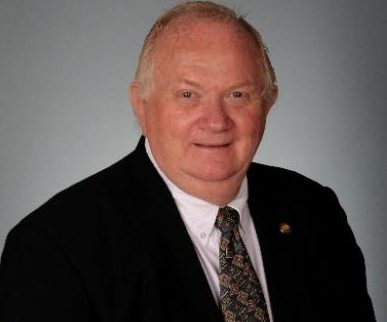Glenn Sebastian
1942 - 2016

Glenn Sebastian, Associate Professor Emeritus at the University of South Alabama, who spent four decades inspiring students in geology and geography, passed away on March 11, 2016, aged 74.
Glenn Robert Sebastian was born on June 18, 1941, and grew up in St. Louis, Missouri. He attended St. Louis University to study geography, graduating with a bachelor’s degree in 1963 and a master’s degree in 1965.
After serving as a park ranger and naturalist on the Blue Ridge Parkway in Virginia, he began his career as an educator. He briefly spent time as an instructor at Indiana State University before moving to the University of South Alabama in 1967. The university, based in Mobile, had only been founded in 1963 and Sebastian was the first geography faculty to be appointed.
He stayed at the University of South Alabama (USA) for the next four decades aside from a time at the University of Northern Colorado for his doctorate in geography. His dissertation, completed in 1977, was entitled “The frequency and selection process of crop combinations in pecan orchards of Mobile and Baldwin Counties, Alabama.”
At USA Sebastian served as Chair of the Department of Geology and Geography (later renamed Department of Earth Sciences when a meteorology program was added to geography and geology) from 1981 until his formal retirement in 2007. He continued to teach students as Professor Emeritus until 2014.
His teaching covered many aspects of physical geography but he was also committed educator, continually seeking to improve teaching and learning, and developing educational resources, as the following diverse examples attest. In the mid-1970s, during his time at the University of Northern Colorado, he worked with Byron Augustin and Don L. Hunter to develop an “Oil Shale Multimedia Kit” for their graduate program, which was endorsed by the National Council for Geographic Education (NCGE) as suitable for schools and colleges.
In the early 1980s Sebastian was involved in a cross-disciplinary project at USA for improving the technical competence of undergraduates in writing, and presented the geography-specific findings at a NCGE conference. The year after, he presented to the NCGE a set of exercises for using the weather maps in a national newspaper to teach intermediate grade students about weather.
In the late 1980s he was involved with reviewing the state syllabus in the “Fund for the Improvement of Post-Secondary Education” project, which was seeking to improve the consonance between preservice courses for geography teachers and the middle school geography curriculum. He was also influential in the creation of “The Excitement of Meteorology!,” a National Science Foundation-funded four-week summer program that brought atmospheric sciences to high school students in Mississippi in the 1990s. Meanwhile, in 2004 he presented a paper at The Geological Society of America’s annual meeting describing how a fieldtrip for geology students to a rock outcrop in Alabama is used to teach them skills of scientific reasoning.
Over four decades, Sebastian taught more than 13,000 students – including multiple generations of families – and was a legendary figure in the university’s academic history. He was particularly known for his field trips, most notably through southwestern United States but also overseas.
Closer to home, he used the on-campus nature trail regularly as an outdoor classroom, not just for teaching students but also taking civic and community groups on short field trips through the area. It is located in headwaters of Three Mile Creek, and over three miles of trails wind through 95 acres of native pine/oak woodlands. In 2012 the university named the trail in his honor, in tribute to his love of and enthusiasm for the outdoors.
In 1990 he received the Outstanding Professor Award from university’s National Alumni Association and was also named Outstanding Faculty Member by Alpha Lambda Delta Freshman Honor Society. In 2005-6 he received a Teaching Excellence Award and in 2006-7 an Outstanding Service Award. In 2013 he was selected by a Faculty Senate committee as one of 50 Outstanding Faculty Members in celebration of the university’s fiftieth anniversary.
Outside of academia, Sebastian was a member of Holy Family Catholic Church in Mobile for 44 years, and was also an active member and past president of a local mystic society. He was a member of Tau Kappa Epsilon Fraternity, serving as a faculty advisor to the USA chapter for many years. He was an avid fan of the South Alabama Jaguars, Alabama Crimson Tide and the St. Louis Cardinals. He also loved spending time with his family, especially his grandchildren, as well as working in his yard and caring for his plants, many of which he brought home from his numerous trips to national parks across the country. He traveled extensively with his family and students including trips to Europe, Hawaii, Australia, Mexico, the Caribbean and all over the continental United States.
Sebastian will be fondly remembered by his former students for his inspiration and encouragement as a teacher and mentor. His name will live on at the university, not only in the Glenn Sebastian Nature Trail, but also through the Glenn Sebastian Award, which is presented annually to an junior level geography major who has made significant contributions to geography, and the Dr. Glenn R. Sebastian Endowed Geography Scholarship, which provides financial assistance to deserving students majoring in geography who demonstrate high academic achievement.
Provost and senior vice president for academic affairs, Dr. David Johnson, said, “Glenn Sebastian left an enduring legacy at the University of South Alabama. Through his 40 years of teaching, he touched the lives of thousands of students who loved his enthusiasm and his passion for learning and living. Glenn was among the greatest teachers I have known and he was a dear friend.”
Sebastian is survived by his beloved wife of 48 years, Darlene, their four daughters, Leanne, Amanda, Megan, and Emily, and their families, which include 9 grandchildren.